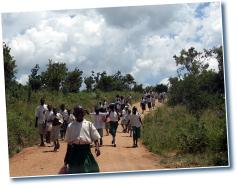 |

December, 2009It was good to get back to Tanzania to see the Sisters and the students once again before this school year finishes on November 27. The girls certainly outdid themselves in their enthusiastic, spirited welcome.
On Sunday, October 25, we had a parish celebration of the Feast of Blessed Celine with our students taking on the liturgical roles of choir and readers. Happiness Makori, one of our Form 2 students, enthusiastically led the choir in spirited song and dance. Of course, on Monday, October 26, we had another all school celebration. This was one of about five days a year that we can afford to serve the girls a few small pieces of meat with their meal. They finished the day with a disco-like program of music and dance. We have asked the Bishop to name Blessed Celine as the patroness of the school and at this time he seems to favor that over other possibilities. One day, I heard a group of girls at the front entrance of the school singing "Happy Birthday". I asked them whose birthday it was and they looked at me strangely and said: "Well, Blessed Celine's, of course!" It was October 29 and they were gathered singing their wishes under her picture which we have at the front entrance of the school.
The main concern of the teachers and students during my time there was the first ever Form 2 National examinations in our school. In their Mock Exams in August in preparation for the National Examinations, our students did extremely well. Each region has its own Mock Exams and in our Mara Region there were 153 schools with 14,514 students taking the exams. Chief Wanzagi ranked 5th among the schools. We were very proud of our students, that in the first year of taking these examinations, they had an average just 1 point below the three schools that tied for second place. Our school was one of only three schools that did not have any failures among the students. Three of our girls were among the top 10 on the chemistry exam. It will take another month or so to get the results of the National Examinations that took place from November 2-11. All the students were required to take examinations lasting 2.5 hours each in nine different subjects and some chose to take a 10th optional examination in Computer and Information Studies. I helped proctor (the English word used there is to "invigilate") all of these with the exception of the English examination. Because I had been their English teacher, I could be nowhere around the part of the building during the English examination! I found the examinations to be quite difficult - and especially since all are in English, which they have only been learning these past two years.
I brought a copy of the 16 page English exam if anyone is interested in seeing it or even taking it! The letter of instructions that Sr. Beata received as Headmistress, stated that there should be police protection on the hour long journey from the site where the exams were picked up to the school. She had to swear to all kinds of oaths of confidentiality to Magistrates (Judges) in a court building!
In order to keep all the regulations regarding these examinations, we needed another room for testing. For this reason, we had to move the teachers from the staff room where they eat all their meals and do their preparation for class and correcting of papers. Because of a lack of classroom space, we can only take one class of 55 new students for Form 1 for the next school year. This has made the rejection of students even more difficult this year than in the past two years. As the school is getting the reputation of being an excellent school, we are getting students from further and further away. Five of the incoming Form 1 students are from the capital of Dar es Salaam, which is a whole day and night's journey from our school by bus. As one of the Montfort Brothers, who teaches in a Diocesan Day School in town, said recently: "Everyone is going crazy about Chief Wanzagi, Chief Wanzagi - everyone wants to go there!" As rewarding as this is, I find it problematic, because we need to follow the country's requirement that admission to a school is by test scores on an entrance test. In our case, this means that fewer and fewer of our poorer local girls can compete with those who come from wealthier families and have had the advantage of English medium primary education.
 |
|
 |